Description

Context: The 13th BRICS summit is set to be held on September 9 in digital format under India’s chairmanship.
About BRICS
- This plurilateral grouping comprising Brazil, Russia, India, China and South Africa is chaired by turn.
- India held the chair in 2012 and 2016
- The importance of BRICS is self-evident: it represents 42% of the world’s population, 30% of the land area, 24% of global GDP and 16% of international trade.
BRICS- The powerful five
- Still, member states have been carrying BRICS forward in an era of complex geopolitics.
- They have bravely continued holding dozens of meetings and summits, even as China’s aggression in eastern Ladakh last year brought India-China relations to their lowest point in several decades.
- The strained relations of China and Russia with the West, and of serious internal challenges preoccupying both Brazil and South Africa.
Four priorities of BRICS
- Launched by a meeting of the Foreign Ministers of Brazil, Russia, India and China in 2006 and riding on the political synergy created by regular summits since 2009.
- BRIC turned itself into BRICS in 2010, with the entry of South Africa.
- The grouping has gone through a reasonably productive journey. It serve as a bridge between the Global North and Global South.
- It developed a common perspective on a wide range of global and regional issues; established the New Development Bank; created a financial stability net in the form of Contingency Reserve Arrangement; and is on the verge of setting up a Vaccine Research and Development Virtual Center.
What are its immediate goals now?
- As the current chair, India has outlined four priorities.
Reform of multilateral institutions
- The first is to pursue reform of multilateral institutions ranging from the United Nations, World Bank and the International Monetary Fund to the World Trade Organization and now even the World Health Organization.
- BRICS emerged from the desire to challenge dominance (by the U.S.) in the early years of the century, and it remains committed to the goal of counter-dominance (by China) now.
Resolve to combat terrorism
- The second is the resolve to combat terrorism. Terrorism is an international phenomenon affecting Europe, Africa, Asia and other parts of the world.
- Tragic developments concerning Afghanistan have helped to focus attention sharply on this overarching theme, stressing the need to bridge the gap between rhetoric and action.
- BRICS is attempting to pragmatically shape its counter-terrorism strategy by crafting the BRICS Counter Terrorism Action Plan containing specific measures to fight radicalisation, terrorist financing and misuse of the Internet by terrorist groups.
Promoting technological and digital solutions for the Sustainable Development Goals
- Digital tools have helped a world adversely hit by the pandemic, and India has been in the forefront of using new technological tools to improve governance.
Expanding people-to-people cooperation.
- But enhancing people-to-people cooperation will have to wait for international travel to revive. Interactions through digital means are a poor substitute.
BRICS opposes exceptionalism: China
- BRICS has been busy deepening trade and investment ties among its member states.
- The difficulty stems from China’s centrality and dominance of intra-BRICS trade flows.
- There is an urgent need for diversification and strengthening of regional value chains.
- Policymakers have been encouraging an increase in intra-BRICS cooperation in diverse areas like agriculture, disaster resilience, digital health, traditional medicine and customs cooperation.
- China’s economic rise has created a serious imbalance within BRICS; Beijing’s aggressive policy, especially against India, puts BRICS solidarity under exceptional strain; and BRICS countries have not done enough to assist the Global South to win their optimal support for their agenda.
Takeaways
- The idea of BRICS – a common pursuit of shared interests by the five emerging economies from four continents – is fundamentally sound and relevant.
- The governments have invested huge political capital in pushing the BRICS experiment forward, and its institutionalisation has created its own momentum.
- BRICS signs deal on cooperation in remote sensing satellite data sharing
https://www.thehindu.com/opinion/op-ed/its-time-to-build-brics-better/article36209516.ece?homepage=true









